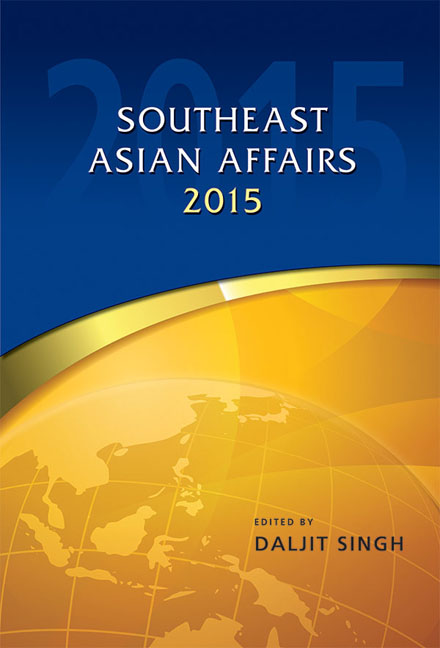Book contents
- Frontmatter
- Contents
- Foreword
- Introduction
- Acknowledgements
- THE REGION
- BRUNEI DARUSSALAM
- CAMBODIA
- INDONESIA
- Indonesia in 2014: Jokowi and the Repolarization of Post-Soeharto Politics
- Junctures of the Old and New: The 2014 Indonesian Elections
- ISIS in Indonesia
- LAOS
- MALAYSIA
- MYANMAR
- THE PHILIPPINES
- SINGAPORE
- THAILAND
- TIMOR-LESTE
- VIETNAM
Junctures of the Old and New: The 2014 Indonesian Elections
from INDONESIA
Published online by Cambridge University Press: 19 May 2017
- Frontmatter
- Contents
- Foreword
- Introduction
- Acknowledgements
- THE REGION
- BRUNEI DARUSSALAM
- CAMBODIA
- INDONESIA
- Indonesia in 2014: Jokowi and the Repolarization of Post-Soeharto Politics
- Junctures of the Old and New: The 2014 Indonesian Elections
- ISIS in Indonesia
- LAOS
- MALAYSIA
- MYANMAR
- THE PHILIPPINES
- SINGAPORE
- THAILAND
- TIMOR-LESTE
- VIETNAM
Summary
Introduction
The fourth democratic election in post-Soeharto Indonesia was a display of interconnections between the old and the new. The 9 April legislative and 9 July presidential elections were the first that saw the maximum impact of the implementation of decentralization and direct elections, and the abolishment of the party-ranking list system. These new schemes have created more open and competitive polls for Parliament. The rise of Joko Widodo (Jokowi), first as Solo mayor, then Jakarta governor, and subsequently as Indonesia's president, is the strongest evidence of the possibilities that have been opened by direct local elections and disbursement of authority to the regions. These have now allowed local leaders to project their career to the highest administrative level. The effect of personalism and leaders’ charisma has strengthened alongside this trend, particularly as parties still lack clear ideological platforms and programmes.
Meanwhile, old campaign tactics and means have interacted with the new realities and challenges of these elections. The prevalence and evolution of money politics — particularly during the legislative round — was evidence of old tactics evolving to sophistication. At the same time, new trends and realities, such as the dominance of legislative candidates, the role of volunteers, and the extent of the utilisation of social media as a means to campaign in the presidential rounds — are new trends, some of which may well become permanent fixtures in the coming elections.
Contrasts between the two presidential candidates were the epitome of the “old versus new”. While Jokowi represented the new breed of leader offering a fresh start, the other candidate Prabowo Subianto, characterized the growth of the sense of longing to return to the old system. The intense campaigning and the results that ensued also demonstrated how divisive the polarizing differences have been.
Legislative Elections: Candidate-centred, Money Rules
The legislative election in April provided strong indications of the emergence of new trends in campaigning at the grass-roots level. Spurred by the abolishment of the party-ranking system introduced just before the 2009 elections, the authority and control of the campaign mechanism have shifted firmly to the candidates. In previous elections, parties controlled candidacy by determining where each candidate would be placed in the ranking list that appeared in ballot papers — the higher the ranking, the better chance to be elected.
- Type
- Chapter
- Information
- Southeast Asian Affairs 2015 , pp. 139 - 153Publisher: ISEAS–Yusof Ishak InstitutePrint publication year: 2015

